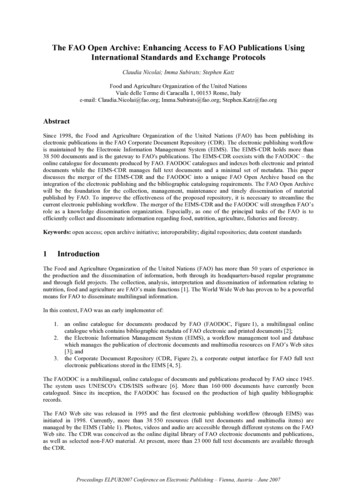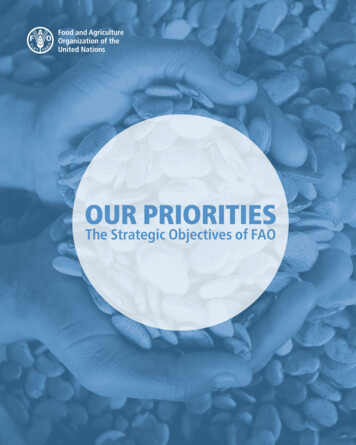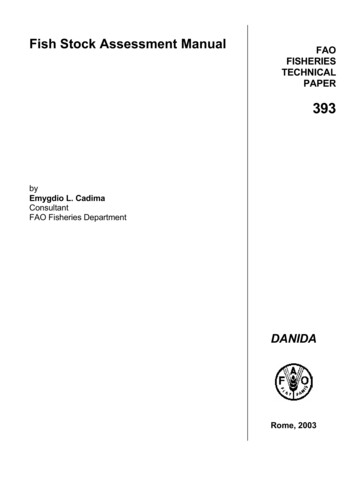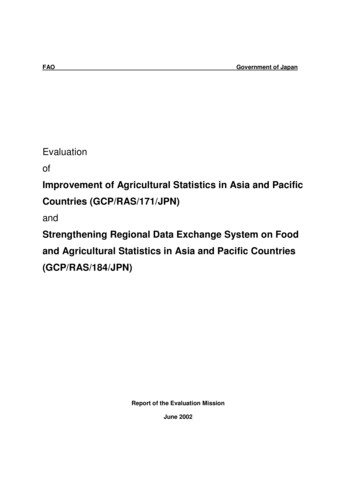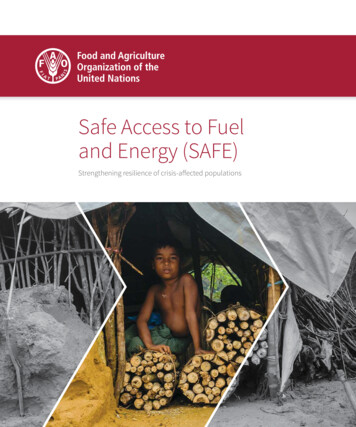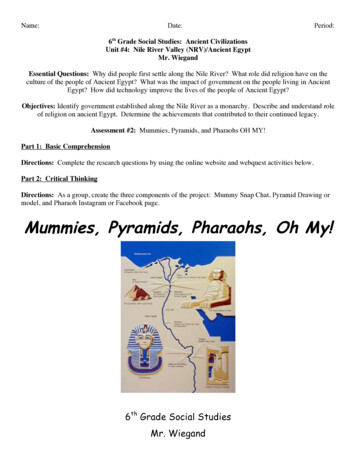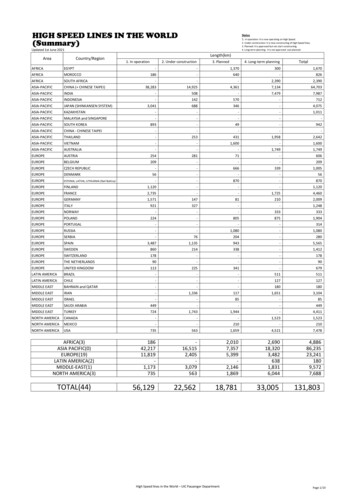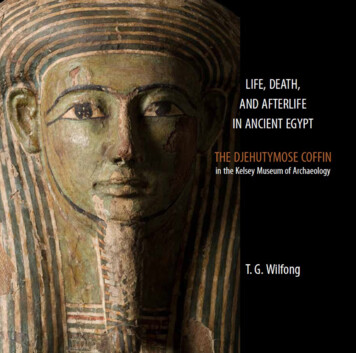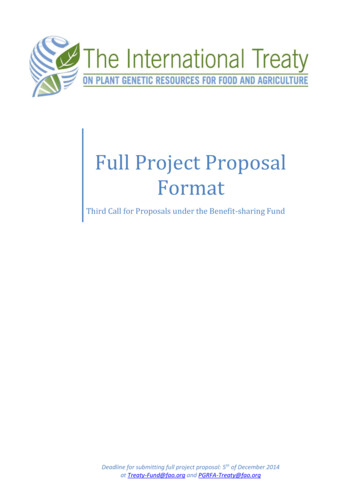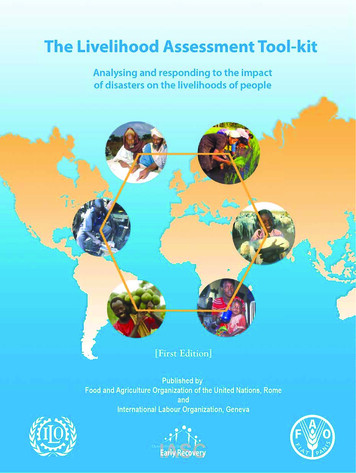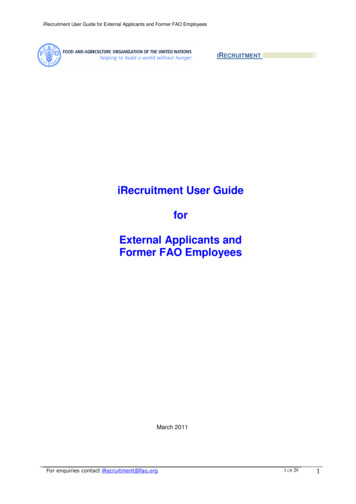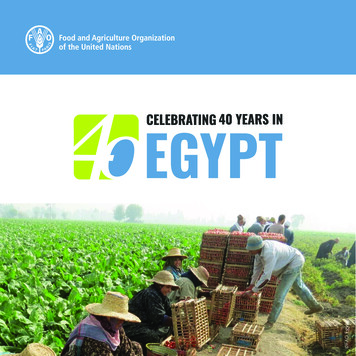
Transcription
FAO Egypt
Since 1978, FAO Representation in Egypt has been a keyplayer in several agricultural and rural developmentactivities that are best suited to Egypt’s needs.19901998Agreements signed at the Agricultural Investment Forum in December 2017In the 1980s, the Food and Agriculture Organizationof the United Nations (FAO) supported the Egyptiangovernment in introducing agricultural policychanges. The idea to create a blueprint for smartand sustainable agriculture has been in the workssince the 1980s, but it finally got off the groundwith the creation of the Sustainable AgriculturalDevelopment Strategy (SADS) between 2008 and2010, launching a state-endorsed medium-termaction plan.During this period, FAO - through cost sharingarrangements with various United Nationsprogrammes, financing agencies and donor countries- provided assistance in building institutional capacityfor strategic planning and efficiency in management. FAO1989 FAO1978From 1978 to 2018:Wheat as a strategic crop in EgyptIn the 1990s, FAO focused on building expert systemsfor improved crop management, the most significantof which is the Central Laboratory for AgriculturalExpert Systems (CLAES) developed under theAgricultural Research Centre (ARC) of the Ministry ofAgriculture and Land Reclamation (MALR).The expert system helps define expert domains suitablefor several applications, such as capturing experts’knowledge in a problem domain; coding and implementing products; testing, packaging, and maintainingsaid products – ultimately helping farmers optimizetheir use of resources while maximizing crop output.FAO has notably helped Egypt improve food securitysince 1997, under the umbrella of its SpecialProgramme for Food Security.
A snapshot of our work20082018 FAO/Nabil Abdel Hakim2009 FAO1999Utilizing rice straw to produce high quality feedFrom empowering Nile Basin countries, includingEgypt, to promoting conservation and fosteringgrowth through investment, FAO has been workingtirelessly during this period to bring severalpromising initiatives and projects to life.The organisation is a key orchestrator of the Nile ForecastCenter at the Ministry of Water Resources and Irrigation(MWRI), helping Nile Basin countries take informeddecisions related to water policy and management.FAO was also successful in introducing utilisationpractices that improve the quality and feed value of ricestraw, addition to encouraging environmental conservation that lure in private-sector investments in it, forruminant livestock feed and biofuel energy production.In 2001, FAO pioneered roof top cultivation in which arange of vegetable crops was grown in different systems.Avian Influenza surveillanceFAO’s main focus themes boiled down to nutritionand food security, water scarcity and climatechange, natural resources management, controlof transboundary animal diseases, fisheries, goodagricultural practices, food loss and waste, as wellas reforestation.In addition to finalising SADS 2030 and supportingseveral agricultural cooperatives, the Food SecurityPolicy Advisory Board was established to enhancefood security policy formulation, analysis monitoringand evaluation.As well, FAO has been helping Egypt combat theAvian Influenza, and Foot and Mouth Disease, inaddition to curbing their negative impact.
Recommendations report for the Food Security Policy Advisory Board FAO Egy0t FAO Egy0tFour stories for four decadesHORTISUN for small-scale producersSupporting agricultural policies and strategiesAgricultural Knowledge Management NetworksIn addition to the Agricultural Development Strategy(SADS), FAO backed up policies in the fields ofsustainable re-use of wastewater in agriculture andestablished a Food Security Policy Advisory Board(FSPAB) to boost technical and institutionalcapacities for food security policy formulation,analysis, monitoring and evaluation at thehousehold, national and regional levels.In collaboration with government ministries, FAOlaunched strategies that helped reform lawsgoverning agricultural cooperatives, as well asstrategies for developing the date palm sector, forwaste reduction and eliminating food loss along thevalue chain.FAO supported MALR in developing several information management systems that are still up andrunning until today, the most prominent of which are: The Rural Development Communication Network(RDCON) to improve communication betweenextension, research and private and publicpersons and institutions involved in rural andagricultural development; and Strengthening of the Horticulture InformationSupport Network for Small Farmers in Egypt (HORTISUN) to support small-scale producers and marketservice providers to ultimately contribute to povertyreduction and sustainable rural development.
organization of the 6th International Inter-ministerialWomen farmers harvesting Molokhia in FayoumPopulation, environment and food securitySince 1994, FAO has been helping Egypt design andexecute three consecutive projects – jointly fundedby United Nations Population Fund (UNFPA) and thegovernment of Egypt – to achieve sustainable ruraland agricultural development.The first two projects worked on seamlessly integrating education on population and family life intoagricultural extension programmes, with a focus onthe environment.Born out of the womb of these projects was a plan tointroduce the same approach throughout the newlands. Awareness was heavily spread via televisionand radio. Such activities yielded a skilled multidisciplinary extension cadre in the field and eventuallylead to awareness campaigns in target villages inaddition to promoting good practices. FAO/Nabil Abdel Hakim FAO/Nabil Abdel HakimIn 2013, the Food Security Policy Advisory Board wasestablished to enhance food secuiryt policyformulation, analysis monitoring and evaluation.Multi-pot system in rooftop gardeningGreen food from green roofsWhen Egypt launched an ambitious programme toenable poor families to grow fresh vegetables onrooftops, terraces or patios, FAO provided the necessary technical expertise to make it happen.This programme was designed to benefit poorerfamilies living in densely populated areas, helpingthem cultivate food for home consumption as well ascreating an additional source of income, which is aperfect setup for stay-at-home women and mothers.The organisation offered a series of know-how trainingworkshops and crash courses on rooftop gardening.Those who received the training were encouraged totransfer this knowledge to others, and the experts hired byFAO started getting requests to conduct similar trainingsfor beneficiaries served by other donors, expanding theprogramme’s scope and reach, and widening its influence.
Support Network for Small Farmers in Egypt(HORTISUN) to support small scale producers andmarket service providers to contribute to povertyWorking together for a #ZeroHunger generationhelping farmers optimize the use of resources whileSignature of Egypt CPFby the Minister ofAgriculture and LandReclamation, and FAOEgypt RepresentativeAgriculture remains a backbone of Egypt’s food security,and in turn a requirement for bettering employmentrates, poverty reduction efforts and empowerment ofrural populations. Because of this, FAO’s support willfocus on the following Egyptian priorities that contributeto 10 out of 17 Sustainable Development Goals.Priority 1: Improved agricultural productivity MALROur priorities and key initiativesFAO’s contribution to improving agricultural productivity includes strengthening agricultural and veterinaryextension services; the enhancement of farmer field-school programmes; increasing the productivity ofsmall-scale dairy farming; enhancing regulation for sanitary and phytosanitary measures; and finallycontributing to a solid surveillance, control and early warning system of transboundary animal diseases withspecial attention to projected climate change impacts.Priority 2: Raising the degree of food security in strategic food commoditiesFAO will support the government of Egypt in developing action plans across different sectors to reduce preand post-harvest food losses and waste in the agriculture sector; support post-harvest management forsmallholder cereal and horticultural producers; strengthen agricultural cooperatives and smallholderproducer groups; and strengthen the public-private policy dialogue in the grain sector, as well as review offood loss and waste reduction strategies.Priority 3: Sustainable use of natural agricultural resourcesFAO will help in boosting the strategy for increasing water productivity in irrigated agriculture in the old andnew lands, as well as newly reclaimed lands; develop a strategy for efficient use and management of water asan adaptive measure to climate change; formulate a strategy for climate change adaptation and naturaldisaster risk reduction in agriculture; and promote water saving technologies.Moreover, FAO will support a strategy for capacity strengthening, water and biodiversity management foragriculture, which includes the development of an oasis agro-ecosystem and a map on soil organic carbon.Furthermore, FAO will support Egypt to share its experise with other African countries through South-South cooperation.
Paving the way for a #ZeroHunger future
FAO Egypt team FAO/Ahmed Hassan
FAOFAO and the Egyptian GovernmentFAO DG’s meeting with Egypt’s President, H.E. Abdel Fattah El SisiEgypt is a founding member of FAO. It hosted the first FAO regional office for North Africa and theNear East in 1952. Afterwards, in 1978 FAO representation in Egypt was established and a long-termrelationship of support started.To further strengthen relations between FAO and the Egyptian Government, several high level visitstook place, the last of which was held by FAO’s Director General in March 2017. During this visit hemet with H.E. President Abdel Fattah El-Sisi, several ministers, Non-Governmental Organizationsand FAO project beneficiaries. The visit translated into an Agricultural Investment Forum andsupport to the Egyptian Government’s 1.5 million feddan project.
Our donorsGovernment of BelgiumGovernment of EgyptGovernment of NetherlandGovernment of GreeceGovernment of SpainEnabling poor rural peopleto overcome povertyEuropean Union. and more
Our partnersMinistries Ministry of Agriculture and Land ReclamationMinistry of EnvironmentMinistry of Foreign AffairsMinistry of HealthMinistry of Investment and International CooperationMinistry of Local DevelopmentMinistry of Planning, Follow Up and Administrative ReformMinistry of Social SolidarityMinistry of Supplies and Internal TradeMinistry of Trade and IndustryMinistry of Water Resources and IrrigationMinistry affiliate entities Agriculture Directorates in govrenoratesAgricultural Research CentreAgriculture Extension and Rural Development Research InstituteCentral Administration for Agriculture ExtensionCentral Administration for Agricultural CooperativesCentral Laboratory for Aquaculture ResearchCentral Laboratory for Date Palm ResearchDesert Research CentreEgyptian Food Safety Information CenterFood Security Information CenterFood Technology Research InstituteForeign Agricultural RelationsGeneral Authority for Fish Resources DevelopmentGeneral Organization for Veterinary ServicesGeneral Department of Locusts and Agro Aviation AffairsNational Nutrition InstituteNational Research CenterUniversities Ain Shams UniversityAlexandria UniversityBeni Sueif UniversityCairo UniversityFayoum UniversityHigh Institute for Agricultural CooperationHeliopolis University for Sustainable DevelopmentKafr El-Sheikh UniversityThe American University in CairoZagazig UniversityCivil Society Organizations CaritasCoptic Evangelical Organization for Social ServicesFayoum Agro Organic Development AssociationHorticultural Export Improvement AssociationInstitute of Cultural AffairsMisr El-Kheir FoundationOrman AssociationPlan International. and more
CapmasNational Research CentreFOOD AND AGRICULTUREORGANIZATION OF THEFAO REPRESENTATION IN EGYPTUNITED NATIONSPO.Box: 100 Cairo - Egypt,11 Al Eslah El Zerai St., Dokki,Tel: ( 202) 33375029, Fax: ( 202) 333789563Cairo, EgyptPostal code: 12311www.fao.orgfao-egy@fao.org/neareast FAO, 2018I9547EN/1/05.18FAOFOODREPRESENTATIONAND AGRICULTUREORGANIZATIONOF THEIN EGYPT11 Al EslahEl Zerai St., Dokki,UNITEDNATIONSCairo, Egypt11Al EslahZerai- St.,Dokki,PO.Box:100ElCairoEgypt,Postal code: 12311Cairo,EgyptTel: ( 202) 33375029, Fax: ( 202) 333789563fao-egy@fao.orgwww.fao.org
FAO has notably helped Egypt improve food security since 1997, under the umbrella of its Special Programme for Food Security. From 1978 to 2018: 1978 1989 1990 1998 Since 1978, FAO Representation in Egypt has been a key player in several agricultural and rural development activities that are best suited to Egypt's needs. FAO FAO
